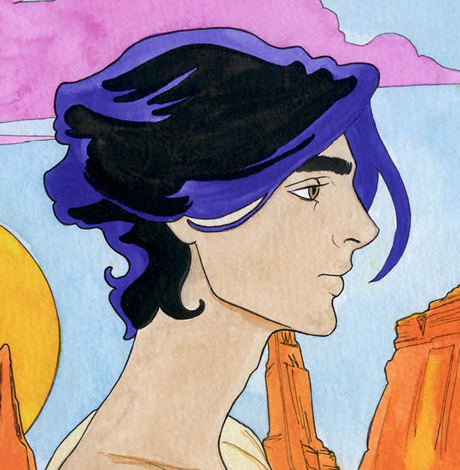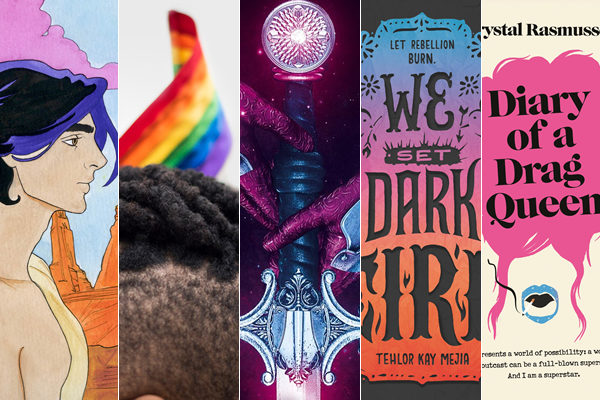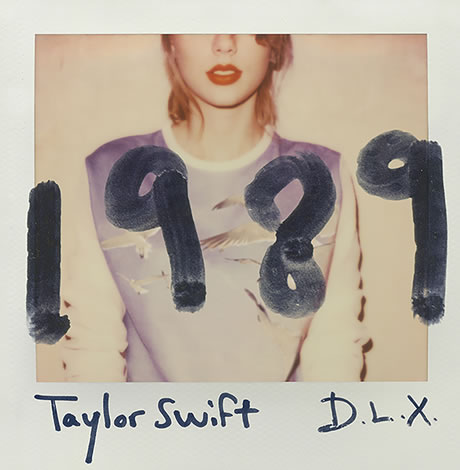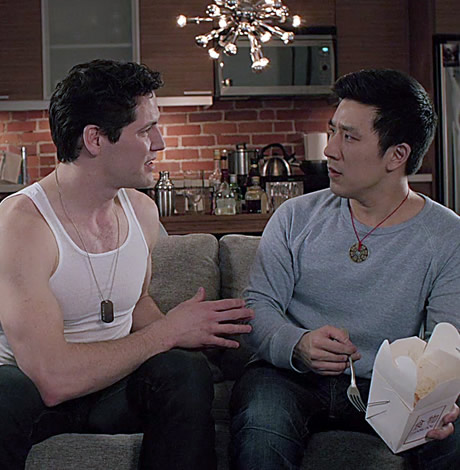Books
SUMMER IN THE CITY 2019: Page turners for the beach or pool
‘Love Falls on Us,’ A Wanderer’s Love Letter’ among summer book highlights


Looking for some refreshing page turners for the summer? Dive into these new LGBTQ novels that are light on the mind.
Award-winning journalist Robbie Corey-Boulet takes on the LGBTQ movement in Africa and how it differs from those in the United States and Europe in his novel “Love Falls on Us: A Story of American Ideas and African LGBT Lives” (Aug. 15).
He argues that the international LGBT activists and allies have created winners and losers within the movement. If someone from an African country identifies with the those of the global movement, then they find support. If their identity doesn’t happen to align so neatly, funding and care can be unavailable.
Especially in a world where LGBT rights are being reversed even in “developed” countries, Corey-Boulet investigates the right way to address LGBT issues in Africa. This novel is for those who care to know the difference in approach.
Upcoming pop artist, Boy Untitled (Mark Tennyson), is releasing his first self-titled EP and accompanying illustrated book of poetry “A Wanderer’s Love Letter to the Universe” (out this month). Both the EP and book reflect a tumultuous time in Tennyson’s life over the course of two years. There are five parts representing stagnation, recognition, action, vision and evolution. Tennyson is a Los Angeles-based artist who began their career in the art scene and slowly transitioned to the sultry, electronica side of pop music.
“Diary of a Drag Queen” (out now) is exactly what the title suggests. Crystal Rasmussen takes readers through her crazy life on a daily basis over the course of a year. She spills the details about her experiences dating men three times her age, sleeping with a VIP for her journalism career, being fired by a well-known magazine and much more. If you’re looking for a new perspective on life, this is the book for you.
Tehlor Kay Mejia tells the tale of Daniel Vargas, the top student at the Medio School for Girls in “We Set the Dark on Fire” (out now). Daniel has two options after graduation: maintain her husband’s household or raise his children.
The only problem is that her paperwork was forged by her parents to give her a better opportunity. Although there’s a few hiccups at her graduation, she gets through the day without anyone discovering her secret. Her new challenge is to spy for a resistance group causing a shift in her newest options: hold onto the privilege her parents sacrificed for her or pursue freeing Medio and a forbidden love.
If you enjoy the tale of King Arthur, “Once & Future” (out now) by Cori McCarthey and Amy Rose Capetta is the novel for you. The main character, Ari Helix, crash lands on Old Earth and pulls the legendary sword from its place making her the newest reincarnation of King Arthur. Merlin, who has aged backwards and is now a teenager, informs Ari that together they must break the curse that keeps bringing back Arthur. They must save humankind, defeat the oppressive government and bring peace to all. No big deal.
“Like a Love Story” (out now) follows three teenagers impacted by AIDS. Abdi Nazimian uses the stories of Reza, Judy and Art to address the complexities of being gay during the 1980s. Reza is an Iranian boy who knows he’s gay but won’t admit it because he worries about the disease affecting him. Judy is a fashion designer who has a strong relationship with her uncle who has AIDS and is active with ACT UP. Art is Judy’s best friend who rebels against his conservative parents by photographing the epidemic and is the only out gay student at school. Somehow Reza and Judy end up dating leaving room for heartbreak and disappointment.
“Red, White & Royal Blue” (out now) is a romantic comedy by Casey McQuiston where the First Son, Alex Claremont-Diaz, and his nemesis, Prince Henry, are forced into a fake friendship to help with his mother’s re-election campaign. After a confrontation between the two was leaked to the tabloids, they were forced to truly get to know one another and their once fake friendship turns into a secret relationship. With President Claremont’s campaign picking up, Alex must make a decision on which matters to him more: his political image or the potential love of his life.
In their first published work, Mason Deaver delivers “I Wish You All the Best” (out now). It’s a story following a non-binary (like the author) character, Ben De Backer, who has recently come out to his family. Disowned and thrown out on the street, Ben has no other choice but to go live with his sister and her fiance who, along with their therapist, are the only other ones to know their identity. Ben tries their best to get through the rest of their senior year by keeping a low profile however, Nathan Allan has other plans for them.
In poet Ocean Vuong’s debut novel “On Earth We’re Briefly Gorgeous” (out now), he explores topics such as race, class and masculinity. The novel is a written letter from a son to his mother who cannot read. It unearths the family history of Little Dog whose roots stem from Vietnam. Written when the speaker is in his late 20s, Vuong takes readers through Little Dog’s life that includes information that even his mother has no clue about including an unforgettable revelation.
Books
Two new books on dining out LGBTQ-style
Visit nightclubs, hamburger joints, and a bathhouse that feeds customers

‘What is Queer Food? How We Served a Revolution’
By John Birdsall
c.2025, W.W. Norton
$29.99/304 pages
‘Dining Out: First Dates, Defiant Nights, and Last Call Disco Fries at America’s Gay Restaurants’
By Erik Piepenburg
c.2025, Grand Central
$30/352 pages
You thought a long time about who sits where.
Compatibility is key for a good dinner party, so place cards were the first consideration; you have at least one left-hander on your guest list, and you figured his comfort into your seating chart. You want the conversation to flow, which is music to your ears. And you did a good job but, as you’ll see with these two great books on dining LGBTQ-style, it’s sometimes not who sits where, but whose recipes were used.
When you first pick up “What is Queer Food?” by John Birdsall, you might miss the subtitle: “How We Served a Revolution.” It’s that second part that’s important.

Starting with a basic gay and lesbian history of America, Birdsall shows how influential and (in)famous 20th century queer folk set aside the cruelty and discrimination they received, in order to live their lives. They couldn’t speak about those things, he says, but they “sat down together” and they ate.
That suggested “a queer common purpose,” says Birdsall. “This is how who we are, dahling, This is how we feed our own. This is how we stay alive.”
Readers who love to cook, bake or entertain, collect cookbooks, or use a fork will want this book. Its stories are nicely served, they’re addicting, and they may send you in search of cookbooks you didn’t know existed.
Sometimes, though, you don’t want to be stuck in the kitchen, you want someone else to bring the grub. “Dining Out” by Erik Piepenburg is an often-nostalgic, lively look at LGBTQ-friendly places to grab a meal – both now and in the past.

In his introduction, Piepenburg admits that he’s a journalist, “not a historian or an academic,” which colors this book, but not negatively. Indeed, his journeys to “gay restaurants” – even his generous and wide-ranging definitions of the term – happily influence how he presents his narrative about eateries and other establishments that have fed protesters, nourished budding romances, and offered audacious inclusion.
Here, there are modern tales of drag lunches and lesbian-friendly automats that offered “cheap food” nearly a century ago. You’ll visit nightclubs, hamburger joints, and a bathhouse that feeds customers on holidays. Stepping back, you’ll read about AIDS activism at gay-friendly establishments, and mostly gay neighborhood watering holes. Go underground at a basement bar; keep tripping and meet proprietors, managers, customers and performers. Then take a peek into the future, as Piepenburg sees it.
The locales profiled in “Dining Out” may surprise you because of where they can be found; some of the hot-spots practically beg for a road trip.
After reading this book, you’ll feel welcome at any of them.
If these books don’t shed enough light on queer food, then head to your favorite bookstore or library and ask for help finding more. The booksellers and librarians there will put cookbooks and history books directly in your hands, and they’ll help you find more on the history and culture of the food you eat. Grab them and you’ll agree, they’re pretty tasty reads.
The Blade may receive commissions from qualifying purchases made via this post.

You’re going to be on your feet a lot this month.
Marching in parades, dancing in the streets, standing up for people in your community. But you’re also likely to have some time to rest and reflect – and with these great new books, to read.
First, dip into a biography with “Marsha: The Joy and Defiance of Marsha P. Johnson” by Tourmaline (Tiny Rep Books, $30), a nice look at an icon who, rumor has it, threw the brick that started a revolution. It’s a lively tale about Marsha P. Johnson, her life, her activism before Stonewall and afterward. Reading this interesting and highly researched history is a great way to spend some time during Pride month.
For the reader who can’t live without music, try “The Dad Rock That Made Me a Woman” by Niko Stratis (University of Texas Press, $27.95), the story of being trans, searching for your place in the world, and finding it in a certain comfortable genre of music. Also look for “The Lonely Veteran’s Guide to Companionship” by Bronson Lemer (University of Wisconsin Press, $19.95), a collection of essays that make up a memoir of this and that, of being queer, basic training, teaching overseas, influential books, and life.
If you still have room for one more memoir, try “Walk Like a Girl” by Prabal Gurung (Viking, $32.00). It’s the story of one queer boy’s childhood in India and Nepal, and the intolerance he experienced as a child, which caused him to dream of New York and the life he imagined there. As you can imagine, dreams and reality collided but nonetheless, Gurung stayed, persevered, and eventually became an award-winning fashion designer, highly sought by fashion icons and lovers of haute couture. This is an inspiring tale that you shouldn’t miss.
No Pride celebration is complete without a history book or two.
In “Trans History: From Ancient Times to the Present Day” by Alex L. Combs & Andrew Eakett ($24.99, Candlewick Press), you’ll see that being trans is something that’s as old as humanity. One nice part about this book: it’s in graphic novel form, so it’s lighter to read but still informative. Lastly, try “So Many Stars: An Oral History of Trans, Nonbinary, Genderqueer, and Two-Spirit People of Color” by Caro De Robertis (Algonquin Books of Chapel Hill. $32.00) a collection of thoughts, observations, and truths from over a dozen people who share their stories. As an “oral history,” you’ll be glad to know that each page is full of mini-segments you can dip into anywhere, read from cover to cover, double-back and read again. It’s that kind of book.
And if these six books aren’t enough, if they don’t quite fit what you crave now, be sure to ask your favorite bookseller or librarian for help. There are literally tens of thousands of books that are perfect for Pride month and beyond. They’ll be able to determine what you’re looking for, and they’ll put it directly in your hands. So stand up. March. And then sit and read.
a&e features
James Baldwin bio shows how much of his life is revealed in his work
‘A Love Story’ is first major book on acclaimed author’s life in 30 years

‘Baldwin: A Love Story’
By Nicholas Boggs
c.2025, FSG
$35/704 pages
“Baldwin: A Love Story” is a sympathetic biography, the first major one in 30 years, of acclaimed Black gay writer James Baldwin. Drawing on Baldwin’s fiction, essays, and letters, Nicolas Boggs, a white writer who rediscovered and co-edited a new edition of a long-lost Baldwin book, explores Baldwin’s life and work through focusing on his lovers, mentors, and inspirations.
The book begins with a quick look at Baldwin’s childhood in Harlem, and his difficult relationship with his religious, angry stepfather. Baldwin’s experience with Orilla Miller, a white teacher who encouraged the boy’s writing and took him to plays and movies, even against his father’s wishes, helped shape his life and tempered his feelings toward white people. When Baldwin later joined a church and became a child preacher, though, he felt conflicted between academic success and religious demands, even denouncing Miller at one point. In a fascinating late essay, Baldwin also described his teenage sexual relationship with a mobster, who showed him off in public.
Baldwin’s romantic life was complicated, as he preferred men who were not outwardly gay. Indeed, many would marry women and have children while also involved with Baldwin. Still, they would often remain friends and enabled Baldwin’s work. Lucien Happersberger, who met Baldwin while both were living in Paris, sent him to a Swiss village, where he wrote his first novel, “Go Tell It on the Mountain,” as well as an essay, “Stranger in the Village,” about the oddness of being the first Black person many villagers had ever seen. Baldwin met Turkish actor Engin Cezzar in New York at the Actors’ Studio; Baldwin later spent time in Istanbul with Cezzar and his wife, finishing “Another Country” and directing a controversial play about Turkish prisoners that depicted sexuality and gender.
Baldwin collaborated with French artist Yoran Cazac on a children’s book, which later vanished. Boggs writes of his excitement about coming across this book while a student at Yale and how he later interviewed Cazac and his wife while also republishing the book. Baldwin also had many tumultuous sexual relationships with young men whom he tried to mentor and shape, most of which led to drama and despair.
The book carefully examines Baldwin’s development as a writer. “Go Tell It on the Mountain” draws heavily on his early life, giving subtle signs of the main character John’s sexuality, while “Giovanni’s Room” bravely and openly shows a homosexual relationship, highly controversial at the time. “If Beale Street Could Talk” features a woman as its main character and narrator, the first time Baldwin wrote fully through a woman’s perspective. His essays feel deeply personal, even if they do not reveal everything; Lucian is the unnamed visiting friend in one who the police briefly detained along with Baldwin. He found New York too distracting to write, spending his time there with friends and family or on business. He was close friends with modernist painter Beauford Delaney, also gay, who helped Baldwin see that a Black man could thrive as an artist. Delaney would later move to France, staying near Baldwin’s home.
An epilogue has Boggs writing about encountering Baldwin’s work as one of the few white students in a majority-Black school. It helpfully reminds us that Baldwin connects to all who feel different, no matter their race, sexuality, gender, or class. A well-written, easy-flowing biography, with many excerpts from Baldwin’s writing, it shows how much of his life is revealed in his work. Let’s hope it encourages reading the work, either again or for the first time.















